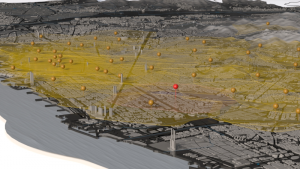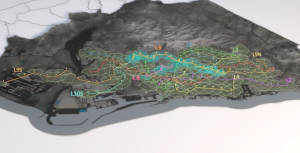March 30, 2023 — Barcelona City Council and the Barcelona Supercomputing Center – Centro Nacional de Supercomputación (BSC-CNS) have presented the first results from the digital twins program for cities. The program is a web platform for analyzing whether Barcelona public facilities and services adhere to the so-called 15-minute city model.
 The platform is the result of the first phase of an ambitious project in which BSC researchers have worked in collaboration with the Municipal Institute of Informatics (IMI) and Barcelona Regional (BR). It is a proof of concept that will serve as a starting point for more elaborate analyses. Through the creation of urban digital twins, simulations can be carried out with the ultimate goal of optimizing the design of public policies.
The platform is the result of the first phase of an ambitious project in which BSC researchers have worked in collaboration with the Municipal Institute of Informatics (IMI) and Barcelona Regional (BR). It is a proof of concept that will serve as a starting point for more elaborate analyses. Through the creation of urban digital twins, simulations can be carried out with the ultimate goal of optimizing the design of public policies.
Cities are a set of highly complex systems. The goal of this digital twin project has been to understand the urban phenomenon by analyzing data, evaluating resources, understanding the accessibility of services, and working with models that are a simplification of this complexity. Models make it possible to work with hypotheses, generate scenarios and visualize multiple variables (or combinations of variables) that can be crucial when making decisions.

Digital twins (DT) are very powerful tools for digitally testing different proposals and extracting information to help decide which public policies or projects may be more efficient. They are very useful for making many hypotheses, building various scenarios, and making predictions.
What sets DTs apart from previous approaches is that they allow data from multiple sources to be integrated in real time and future scenarios to be evaluated by means of complex simulations. The development of these tools allows for more efficient resource management. Pre-testing the different options for solving a problem on digital twins can anticipate results and prevent problems or crises.
The initial phase of this project has made it possible to reproduce Barcelona in an approximate digital model, making it possible to visualize scenarios. For example, the model can show the coverage within a 10-minute walk of metro stops, before and after the opening of the future L8 and L9 lines.
A New, More Ambitious Phase of Development
Once the first phase has been completed, BSC and the City Council plan to develop a more complex and robust digital twin project with more interrelated data. The aim is to develop a digital twin tool that can be used by any city for urban planning.

In the second phase within 2 to 4 years, BSC is to assume the technological and construction leadership, and the Barcelona City Council will be the potential data provider. Barcelona Regional (BR) will take on the role of customer. And finally, the Barcelona Municipal Institute of Informatics (IMI) will assume the project’s coordination, planning possible collaborations with other cities.
This second phase is part of the collaboration framework between Barcelona, Bologna, BSC, the Inter-University Consortium CINECA, and the University of Bologna. They signed an agreement to develop an evidence-based public policy model through the creation of urban digital twins with the aim of improving public policies in both cities.
About BSC
Barcelona Supercomputing Center-Centro Nacional de Supercomputación (BSC-CNS) is the national supercomputing center in Spain. The center is specialized in high performance computing (HPC) and manages MareNostrum, one of the most powerful supercomputers in Europe, located in the Torre Girona chapel. BSC is involved in a number of projects to design and develop energy efficient and high performance chips, based on open architectures like RISC-V, for use within future exascale supercomputers and other high performance domains. The center leads the pillar of the European Processor Project (EPI), creating a high performance accelerator based on RISC-V.
Source: BSC



























































